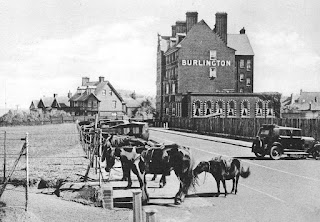 |
| Acadia, just launched, c.1929. L to R: Uncle Henry William, Cousin Henry Robert, Me (seated), Father Robert Harry with Brother Jack on his lap |
In the winter months, some of the fishermen kept going to sea, but the weather most days was not good enough. Most of the men went stone picking on the beach**. The stones were a special type used for pottery and millions of tons were sent by rail to Stoke.
 |
| Stone Picking on Sheringham Beach |
My father started stone picking when the cod fishing didn't pay, and I had to go down and help as soon as I came out of school no matter what the weather to pick the blue stones into six stone [around 40kg] peds and help push them to the weigh-in near the Burlington Hotel.
After school in the afternoon, back to the beach, maybe at the East or West End and help to get a load ready for the morning. It was killing work, fingers sore, you didn't have any need to cut your fingernails.
It was about this time before I left school at 14 that I learnt to braid a crab pot. This was what you needed to do before you got your first pair of sea boots.
 |
| Me and Jimmy Bishop braiding Crab Pots at the East End |
My hope of getting to sea when I left school didn't come off. Money was short and times were hard. After leaving school I went stone picking as my first job. You got paid six shillings and six pence [32½p] a ton. I never ever picked a ton in one day and many of the men didn't either. Father made me a barrow from pram wheels but it didn't last long - just the rest of the winter.
When my grandfather 'Joyful' was alive, I always had my weekend at 32 Beeston Road. On Saturdays, I would get their pension at the Beeston Post Office, known as Beale's Store. Besides the Post office, the store sold everything and, with a shopping list, I got granny's groceries. For this errand I got what I called my Saturday penny.
 |
| Grandfather talking to young visitors |
 |
| Granny with a Customer at the Crab Shop |
** Stone picking from the beaches has been banned since the 1960's
